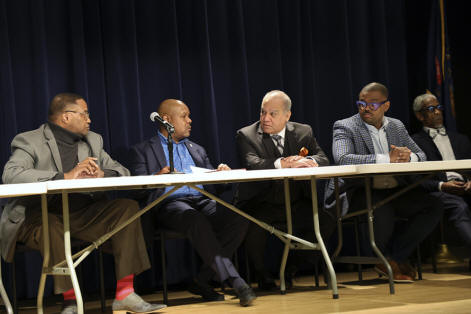|
The
project
Impact
Area
contains
all of
Census
Tracts
5207,
5225,
and
5173, as
well as
a
portion
of
Census
Tract
5172 in
the City
of
Detroit.
As shown
on the
map,
this
area is
bounded
by
Martin
Luther
King
Blvd.
and Mack
Ave. to
the
north,
I-75 and
I-375 to
the
east,
Macomb
St.,
Monroe
St., and
Michigan
Ave. to
the
south,
and M-10
to the
west.
The
Impact
Area
includes
parts or
all of
the
following
neighborhoods:
Downtown,
Midtown,
Brush
Park,
Brewster
Homes,
and
Douglass. |
|
|
|
|
|
|

|
 |
 |
|
|
|
|
|
|
 |
|
|
The
Neighborhood
Advisory
Council
comprises
nine
members
plus an
alternate
living
in the
project's
impact
area.
Pictured
for the
benefits
agreement
(CBA)
signing
are
Jonathan
Kinlock,
Chris
Jackson,
Rogelio
Landin,
Eddie
Hall,
III and
Henry
Williams.
(Photo
by HB
Meeks/Tell
Us
Detroit) |
| |
District
Detroit
NAC
holds
signing
ceremony
for community
benefits
package,
valued
at $167M
DETROIT
- The
Neighborhood
Advisory
Council
for the
District
Detroit
project
signed
its
support
letter
for the
community
benefits
agreement
(CBA).
This
initiative
is part
of a
package
that
delivers
$167
million
in
benefits
for the
community
that
lives in
the
project's
impact
area and
for the
city of
Detroit.
The NAC
has
negotiated
with the
developers
to get a
commitment
of
nearly
$12
million
in
additional
spending
to
address
identified
impacts.
The
District
Detroit
development
is
expected
to bring
$1.5
billion
in
action
to the
downtown.
The NAC
voted
8-1 late
last
month to
recommend
that
Detroit
City
Council
approve
the CBA.
The
District
Detroit
CBA is
the
largest
of the
13
projects
to go
through
the
Community
Benefits
Ordinance
process
since
the
ordinance
took
effect
in 2017.
Detroit
is the
largest
city in
the
country,
with a
CBO
process
to
guarantee
residents
will
benefit
from
significant
developments
and be
protected
from
potentially
adverse
effects.
Any
project
in
Detroit
with a
total
value of
$75
million
or more,
receiving
more
than $1
million
in tax
abatements
or $1
million
or more
in value
of a
City
land
sale or
transfer,
is
subject
to the
CBO
process.
The
Neighborhood
Advisory
Council
comprises
nine
members
plus an
alternate
living
in the
project's
impact
area.
These
residents
are
selected
by their
fellow
impact-area
residents,
City
Councilmembers,
and the
City of
Detroit
Planning
&
Development
Department.
Through
working
with the
District
Detroit
developers,
the
Neighborhood
Advisory
Council
has
secured
a number
of
benefits
for
their
fellow
Detroiters,
including:
1.
Acceptance
of
tenants
utilizing
Section
8
Vouchers
in all
affordable-housing
units.
2.
Tenant's
Right to
Renew
for all
affordable-housing
units.
3.
Affordable
parking
spaces
subsidized
at 50%
discount
for all
affordable-housing
units.
4.
Spending
a
minimum
of $100
million
of the
development
budget
with
disadvantaged
businesses.
5.
Commissioning
a study
to honor
local
culture
and
history,
as well
as a
minimum
spending
commitment
to
purchase
art from
local
Detroit
artists
for the
projects.
6. A
physical
space to
connect
Detroiters
to the
developers
for
housing,
job and
internship,
and
business
opportunities.
7.
Hiring
of an
accessibility
consultant
to
ensure
all 10
projects
meet and
exceed
ADA
requirements.
8.
Creation
of a
Tenant
Improvement
Fund for
disadvantaged
and
emerging
entrepreneurs
renting
space in
District
Detroit
properties.
9.
Commitment
by the
developer
to
partner
with
local,
emerging
developers
on three
new
projects
within
District
Detroit.
This
event
was
hosted
by the
NAC,
which
negotiated
the CBA
as part
of the
process
facilitated
by the
City's
Planning
&
Development
Department.
For
more
information
on the
City of
Detroit's
CBO
process,
go to
https://detroitmi.gov/departments/planning-and-development-department/design-and-development-innovation/community-benefits-ordinance
Advertise With Us:

Certified Minority Business Enterprise

|
|
|
|
|
|
|
|
|